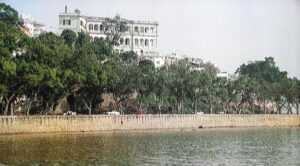Bela Vista – Recollections of a Wartime Childhood
Raquel de Carvalho Remedios
First published in UMA Bulletin Spring 2013; reproduced here with links to people’s personal pages and with the addition of a photo from Escola Particular Idália da Luz
It was Monday morning, December 8, 1941 and our amah, Ah Say, was trying her best to get my sister and me dressed and ready for school. I was five and Rosa four and we were in kindergarten at St Mary’s School, Chatham Road, Kowloon, a short distance from our flat on Salisbury Avenue. As we were about to leave for school, my grandmother, Avó Genie, telephoned to say that there was bombing across the harbor and Hong Kong was under attack by the Japanese. Thus began the Second World War for us in Hong Kong and an epochal change in our young lives.
My father, , was in the Hong Kong Auxiliary Police Force, fulfilling his obligation in the essential volunteer services to defend the British Colony of Hong Kong in time of war. When war did break out, however, the Auxiliary Police was in disarray, and then it was disbanded. My father decided it was not safe for the family to stay in the flat on Salisbury Avenue; he booked our family including my grandparents into the Peninsula Hotel near the harbor. We were to remain at the Peninsula all through the hostilities, up until Hong Kong surrendered to the Japanese on Christmas Day. At that point, citizens were allowed to return to their homes.
We lived in Kowloon under Japanese occupation for about six months to mid 1942, when it became increasingly difficult for my parents to obtain food for the family. They then decided to leave to join my grandparents, aunts, and uncles, who had already taken refuge in Macau early in 1942. The Government in neutral Macau, under Governor Gabriel Teixeira, provided aid to the Hong Kong Portuguese residents by chartering several ships to evacuate them to Macau.
We were to live at the Bela Vista, a hotel that had been requisitioned by the Government, as one of many centers, to house the refugees. It was a charming nineteenth century building, halfway up Penha Hill, with a commanding view of the outer harbor and the lovely Praia Grande. It had spacious terraces and walkways set among the trees, and it stood out among the many well-kept, pastel-hued residences and lush gardens at the southeastern edge of the Colony. Looking back now after more than seven decades, I would count the residents of the Bela Vista among the most fortunate of refugees in Macau during WWII, if only because of its idyllic setting and its pleasant accommodations.
I well remember our first day at the Bela Vista. My sisters, and , and I (ages 6, 5 and 3) were greeted by a group of children, ranging in ages from 5 to 12. They were curious and eager to make the acquaintance of the latest arrivals at the center. My parents had packed a bathtub-sized rattan basket filled with our toys and brought it with us to Macau. As a result of this bounty, the three of us were very popular with the kids; they certainly did have fun diving into our basket and coming up with a new plaything each time. This was the beginning of what would prove to be three happy and wonderful years for us at the Bela Vista Hotel.
Unlike our parents, we children were not burdened by the mental anguish, deprivations and uncertainties of the war. We had enough to eat, even though the food was often lacking in adequate nourishment. We had children to play with in safe and spacious surroundings. The wartime world, confining and uncertain though it might have been for the adults, was a pleasant enough place for us children. It was a veritable playground to which we very quickly adapted.
Soon after our arrival at the Bela Vista, my parents decided that we would have to continue our education and they enrolled my sister Rosa and me in school, first at Idália da Luz Private English School and then Santa Rosa da Lima Convent School.
It seems strange to me looking back that there were still hotel guests from before the war staying at the Bela Vista during the time it was a refugee center. They occupied the spacious guest rooms on the 2nd level and enjoyed the services of a number of the hotel staff that had been retained to look after their needs. I still recall some of the names of the guests: Pedro Ângelo, Albuquerque, Laranjeira, and Vila Franca.
As I am writing this piece, 68 years since we left Macau at the end of the Second World War, I can still recall many of the names and faces of the people who were residents of the Bela Vista Center. They are:
and and Family: , , , and
,
and and Family: , , and
and and Family: Delsa, Tony, Carlos, Girlie, Vera, Edward, Julie and Branda
and and Family: , , , and
and and Family: , , , and
and and Family: , , , and
Eça Silva Family: , , and
Mr and and Family: , , , , , and
and Family: Bill, , , , , , and Armando Jr “Pinky”.
and Family: , , , , , , , , and .
Virgilio and Mina Neves and Family: Cissy, Marie and Alio
and Family: , , , , , , , , and .
Mrs. Gardner and Daughters: Phyllis, Cutie and Frances
and Daughters: and
Bobbie Gardner
Alan Castro
and Son
The Gutierrez Family: , and Betty
Fernando Pereira
The Baptista Family:, , and
and and Family: , , and
and and
and and Family: , , , and
and
and daughter
Inez Savard Remedios and Daughters: and
and Ribeiro and daughter
The Sequeira Family: , , , and
and and Family: and
and Idie Rozario and
and Family: , and
Ruby Souza and daughter Gloria and son Peter Gilbert
Mr and Mrs Francis Xavier
and and son
and and son
and daughter
,
and and son
Mrs. Brooks and Family: Sonny, Irene and Audrey
Mr and Mrs Sebastiao Costa and Family: Frederick, Rita, Richard and Tecla
and Family: 2 sons and daughters, and
Domingo Portugal
And a few Goan families whose names I do not recall.
In August of 1945, following the Japanese surrender, my father returned to Hong Kong to survey the aftermath of the war and the Japanese occupation, and to see about resettling his family. During his brief stay, he secured a lease of a 3-storey home on Prince Edward Road, Kowloon from Credit Foncier (a French-owned company set up to manage the real estate of the French Fathers in Hong Kong), and was back in Macau in early September to bring our family back to Hong Kong.
We left Macau lock, stock and barrel, and we were packed aboard an overloaded Chinese junk for the journey home. My recollection is that it was a long trip and the sea was very rough – most of the passengers were sick, and were throwing up all over the deck.
When we arrived in Hong Kong, we first went to the Chase Bank at Marina House in Queen’s Road, Central, where my aunt, Amalia de Carvalho Remedios, was living on the mezzanine floor. She had returned from Macau a few weeks earlier to assist in the reopening of the Chase National Bank and was given temporary housing in the bank premises. After that meeting with my aunt, my father decided that the family should go to Kowloon and settle into our new home on Prince Edward Road.
We took the Star Ferry to Kowloon and then rode in pedicabs to Prince Edward Road which took a while. I remember when the pedicab turned from Nathan Road into Prince Edward, it was dark and there was a full moon that night. As we proceeded on Prince Edward Road, past the railroad bridge, the spire of St. Teresa’s Church came into view and the full moon was just over the steeple. It was a sight that I have never forgotten.
Although we had returned to live in a beautiful home with a large front and back garden, in those first few weeks after our arrival, my sisters and I missed our many friends and playmates and longed to be back at the Bela Vista. Shortly thereafter, however, with the end of the war, the Pomeroy family returned to Hong Kong and much to our delight, moved in across the street from us. We were to remain lifelong friends. In time, we made new friends when many Portuguese families moved into the Kowloon Tong neighborhood, and a large community of Filhomacaus was established in the St. Teresa’s Church Parish.
In looking back over these many long years, I recognize of course that there had been much suffering and privation due to the war. There had been the separation of families from their loved ones – fathers, husbands and sons who had been in Japanese prison camps for the duration of the war. Then there had been illnesses and malnutrition resulting in the deaths of many loved ones, the loss of property and income, and other emotional and physical hardships. The adults and especially the elderly carried the weight of all these worries.
Still, for those of my generation who underwent the war years in Macau, it might fairly be said that we were far more fortunate than many, many other refugees in Asia and around the world. Indeed, the Hong Kong Portuguese who found refuge in a welcoming Macau had much to be grateful for throughout their stay, not the least of which was their survival. And those who stayed at the Bela Vista were, in my view, the most fortunate of all.
For me personally, I will always cherish the happy memories of our childhood years at the Bela Vista.
March 2013





